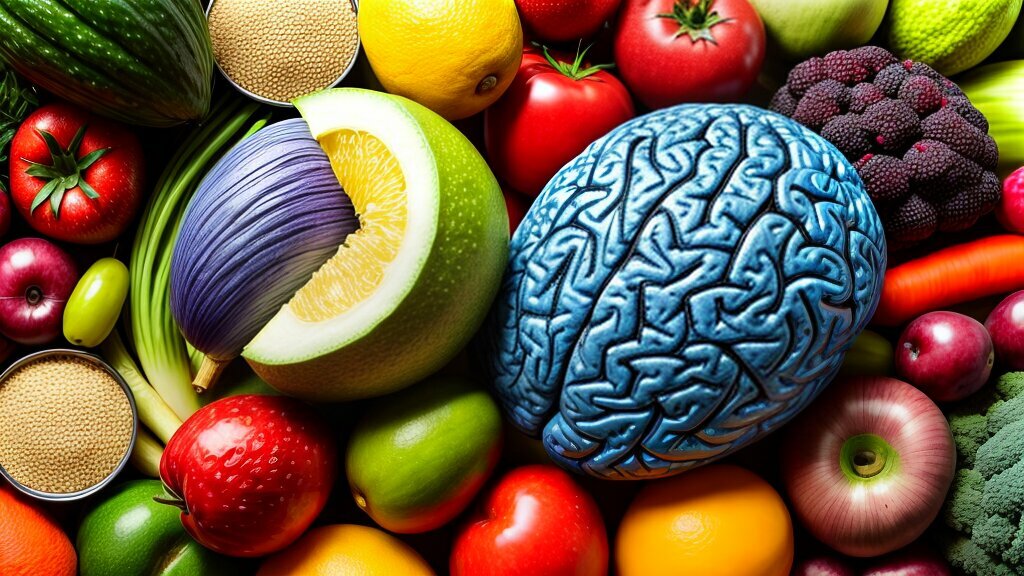You may have heard of the saying “you are what you eat,” and this holds true not only for physical health but also for mental health. Nutritional psychiatry is an emerging field that explores the link between diet and mental health. By making simple changes to your diet, you can enhance your mental well-being and improve your quality of life.
Studies have shown that certain dietary patterns, such as the Mediterranean diet, can reduce the risk of depression and anxiety. On the other hand, a diet high in processed foods, sugar, and unhealthy fats can have a negative impact on mood and cognitive function.
In this article, we will explore the concept of nutritional psychiatry and its potential to improve mental health. We will discuss the relationship between diet and mental health, the role of brain health nutrition, and the connection between the gut and the brain. We will also provide practical tips and strategies for using nutrition to support mental well-being.
Key Takeaways:
- Nutritional psychiatry is an emerging field that explores the link between diet and mental health.
- A well-balanced diet can reduce the risk of depression and anxiety and improve mood and cognitive function.
- In this article, we will explore the role of nutrition in supporting mental health and provide practical tips for using nutrition to enhance well-being.
The Connection Between Diet and Mental Health
Did you know that what you eat can have a profound impact on your mental health? Research suggests that certain foods can affect our mood and well-being. For example, consuming a diet high in refined carbohydrates and sugar has been linked to depression and anxiety. On the other hand, a well-balanced diet consisting of whole foods can help improve mental health.
In fact, studies have found that a Mediterranean-style diet, rich in vegetables, fruits, whole grains, lean protein, and healthy fats, can reduce the risk of depression by up to 30%. This is because the nutrients found in these foods, such as antioxidants and omega-3 fatty acids, are essential for optimal brain function and mental well-being.
Additionally, certain foods can have an immediate impact on our mood. For example, consuming foods high in tryptophan, such as turkey or tofu, can increase levels of serotonin in the brain, a neurotransmitter that regulates mood and sleep. Similarly, foods high in magnesium, such as leafy greens and nuts, can help reduce stress and anxiety.
| Foods to Include: | Foods to Limit: |
|---|---|
|
|
By making small changes to your diet, you can improve your mental health and overall well-being. Start by incorporating more whole, nutrient-dense foods into your meals and limiting consumption of processed, high-sugar foods. Consider consulting with a registered dietitian for personalized guidance.

Brain Health Nutrition: Feeding Your Mind
What you eat can have a significant impact on your mental health. Certain nutrients and dietary patterns have been found to enhance cognitive function and promote psychological well-being. Here’s what you need to know about brain health nutrition:
1. Omega-3 Fatty Acids
Omega-3 fatty acids have been found to improve mood and reduce symptoms of depression. These essential fats are crucial for brain function, playing a key role in the formation and maintenance of neural pathways.
| Food Sources: | salmon, trout, sardines, walnuts, flaxseeds, chia seeds |
|---|---|
| Daily Recommended Intake: | 250-500 mg of EPA+DHA combined |
Incorporating omega-3 rich foods into your diet can be as simple as adding a serving of oily fish to your weekly meal plan or sprinkling some chia seeds onto your morning oatmeal.
2. Antioxidants
Antioxidants protect the brain against oxidative stress and inflammation, two factors that can contribute to cognitive decline and mental health problems.
| Food Sources: | blueberries, dark chocolate, pecans, artichokes, kidney beans |
|---|---|
| Daily Recommended Intake: | at least 2 servings of fruits and vegetables per day |
Stock up on colourful fruits and veggies, like blueberries and artichokes, to boost your antioxidant intake and protect your brain from damage.
3. B Vitamins
B vitamins are involved in brain function and the production of neurotransmitters, which regulate mood and cognitive function.
| Food Sources: | spinach, broccoli, lentils, chickpeas, eggs, dairy |
|---|---|
| Daily Recommended Intake: | varies based on the specific B vitamin, but an overall balanced intake is recommended |
Get your daily dose of B vitamins by incorporating foods like spinach and lentils into your diet, or consider taking a B-complex supplement.

Keep in mind that a diet rich in whole, nutrient-dense foods is generally beneficial for brain health. Aim to eat a variety of fruits, vegetables, lean proteins, whole grains, and healthy fats to optimize your mental well-being.
The Gut-Brain Axis: How the Microbiome Affects Mental Health
If you’re looking to improve your mental health, it’s worth paying attention to your microbiome – the collection of microorganisms that live in your gut. Research shows that the gut-brain axis is a two-way communication system, meaning that the health of your gut can affect your mental well-being and vice versa.
Your gut is home to trillions of bacteria, fungi, and viruses, collectively known as the microbiome. These microorganisms play a vital role in maintaining the health of your digestive system and immune system, but they also produce neurochemicals that affect your mood and behaviour.
Studies have linked an imbalance in the microbiome with an increased risk of anxiety, depression, and other mental health disorders. Conversely, a healthy microbiome has been associated with better mood, cognitive function, and emotional resilience.
| Top tips for nurturing your microbiome: |
|---|
| Eat a diverse range of plant-based foods: A variety of fruits, vegetables, whole grains, and legumes can help to nourish the good bacteria in your gut. |
| Avoid processed and high-sugar foods: These can promote the growth of harmful bacteria and disrupt the balance of your microbiome. |
| Consider taking a probiotic supplement: Certain strains of beneficial bacteria can help to rebalance your microbiome and improve gut health. |
It’s also worth noting that stress can have a significant impact on the gut-brain axis. Chronic stress can disrupt the balance of your microbiome and increase inflammation, which can contribute to mental health issues. Practicing stress-reducing techniques, such as meditation or yoga, can help to support a healthy microbiome and improve mental well-being.
By nurturing your microbiome, you can support your mental health and overall well-being. So, next time you’re making dietary choices, remember to consider the impact they could have on your gut-brain axis.

Nutritional Approaches to Enhance Mental Health
Improving your mental health through nutrition is not just about what you eat, but also when and how you eat. Here are some practical tips and guidelines to help you enhance your mental well-being:
Dietary Recommendations
A well-balanced diet that includes whole foods, such as fruits, vegetables, whole grains, lean proteins, and healthy fats, can provide your body with the nutrients it needs to function optimally, including your brain. Consider reducing your consumption of processed and sugary foods, which can contribute to inflammation and other negative health outcomes.
Meal Planning
Meal planning can help you make healthier choices and avoid impulsive food decisions. Try to plan your meals ahead of time, including snacks, and make a list before grocery shopping. This can help you stay on track and avoid less healthy options when you’re hungry and pressed for time.
Lifestyle Changes
Small lifestyle changes can add up and have a significant impact on your mental health. For example, try to eat mindfully, focusing on the taste, texture, and aroma of your food. Mindful eating can help you connect with your body’s hunger and fullness signals, reducing the likelihood of overeating. Additionally, regular physical activity and quality sleep can also support mental health and well-being.
Supplements
While it’s always best to get your nutrients from whole foods, some people may benefit from supplements. Talk to your healthcare provider about any supplements you’re considering, as some may interact with medications or have other potential risks. Omega-3 fatty acids, B vitamins, and probiotics are some supplements that have been studied for their potential benefits for mental health.
Seek Professional Help
If you’re struggling with mental health issues, it’s important to seek professional help. A healthcare provider can help you develop a personalized treatment plan that may include dietary changes, psychotherapy, and/or medication. Don’t hesitate to reach out for help if you need it.

The Power of Nutrition: Improving Cognitive Function
You may not realize it, but the food you eat plays a crucial role in your cognitive function and mental well-being. By choosing the right brain health nutrition, you can improve your memory, focus, and overall cognitive abilities. Here are some key nutrients and foods that can enhance your brain function:
| Nutrient/Food | Benefits |
|---|---|
| Omega-3 fatty acids (found in fatty fish, nuts, and seeds) | Improves memory and cognitive function, reduces inflammation in the brain |
| Dark chocolate (at least 70% cacao) | Enhances focus and concentration, boosts mood and alertness |
| Blueberries | Improves memory and cognitive function, protects against oxidative stress in the brain |
| Leafy greens (such as spinach and kale) | Rich in vitamins and antioxidants that support brain health and cognitive function |
| Turmeric | Reduces inflammation in the brain, improves memory and cognitive function |
It’s important to note that a well-balanced diet is essential for optimal brain health. In addition to the specific nutrients and foods listed above, be sure to incorporate a variety of fruits, vegetables, whole grains, lean proteins, and healthy fats into your diet.
Avoid consuming excessive amounts of sugar and highly processed foods, which can lead to inflammation in the brain and impair cognitive function. In addition to making dietary changes, regular exercise and adequate sleep are also crucial for cognitive function and overall mental well-being.

By prioritizing brain health nutrition and making healthy lifestyle choices, you can enhance your cognitive function and improve your overall quality of life.
The Power of Nutrition: Improving Cognitive Function
Good nutrition is not just important for physical health, it’s also vital for optimal cognitive function. The brain requires specific nutrients to function at its best, and making dietary changes can have a significant impact on mental performance and overall well-being.
The Role of Nutrition in Cognitive Function
Research has shown that certain nutrients, such as omega-3 fatty acids, B vitamins, and antioxidants, are important for cognitive function. Omega-3 fatty acids, found in fatty fish, nuts, and seeds, have been linked to improved memory and focus. B vitamins, found in leafy greens, nuts, and beans, are essential for brain function and can improve cognitive performance. Antioxidants, found in fruits and vegetables, protect the brain from damage caused by free radicals and improve brain function.
The Impact of Nutrition on Memory and Focus
Memory and focus are essential for daily tasks, and can be improved through proper nutrition. In addition to omega-3 fatty acids and B vitamins, studies have shown that caffeine, found in coffee and tea, can improve cognitive performance, attention and alertness. Berries, such as blueberries, have also been found to enhance memory and reduce cognitive decline in aging adults.
Nutritional Approaches for Cognitive Health
To improve cognitive function, it’s important to incorporate brain health nutrition into your diet. Aim to consume a variety of fruits and vegetables, lean protein, whole grains, and healthy fats, such as those found in nuts and seeds. It’s also important to stay hydrated and limit processed foods and sugar. Meal planning and mindful eating can also improve cognitive function by providing consistent, balanced nutrition throughout the day.
Conclusion
Nutrition plays a crucial role in cognitive function and overall mental well-being. By making dietary changes and incorporating brain health nutrition into your everyday diet, you can improve memory, focus, and overall cognitive abilities. Remember to aim for a well-balanced diet, stay hydrated, and limit processed foods and sugar. By adopting these nutritional approaches, you can enhance your cognitive function and improve your overall quality of life.
FAQ
Q: What is nutritional psychiatry?
A: Nutritional psychiatry refers to the field of study that explores the relationship between diet and mental health. It investigates how the foods we consume can impact our mood, emotions, and overall well-being.
Q: How does diet affect mental health?
A: Certain foods can influence our mood and mental health. A well-balanced diet that includes a variety of nutrient-rich foods can promote optimal mental well-being, while a poor diet lacking essential nutrients may contribute to mental health issues.
Q: What is brain health nutrition?
A: Brain health nutrition focuses on consuming foods that support cognitive function and promote mental well-being. Specific nutrients, such as omega-3 fatty acids, antioxidants, and vitamins, play a crucial role in maintaining brain health.
Q: How does the gut-brain axis affect mental health?
A: The gut-brain axis refers to the bidirectional communication between the gut and the brain. The microbiome, the collection of microorganisms in our gut, influences our mental health. Certain dietary factors can impact the gut-brain axis, either positively or negatively.
Q: What are some nutritional approaches to enhance mental health?
A: To enhance mental health through nutrition, it is important to consume a well-balanced diet that includes whole grains, lean proteins, fruits, vegetables, and healthy fats. Incorporating probiotics, reducing processed foods, and staying hydrated can also contribute to better mental well-being.
Q: How does nutrition improve cognitive function?
A: Nutrition plays a crucial role in improving cognitive function. Certain nutrients, such as omega-3 fatty acids, B vitamins, and antioxidants, support brain health and enhance memory, focus, and overall cognitive abilities.
